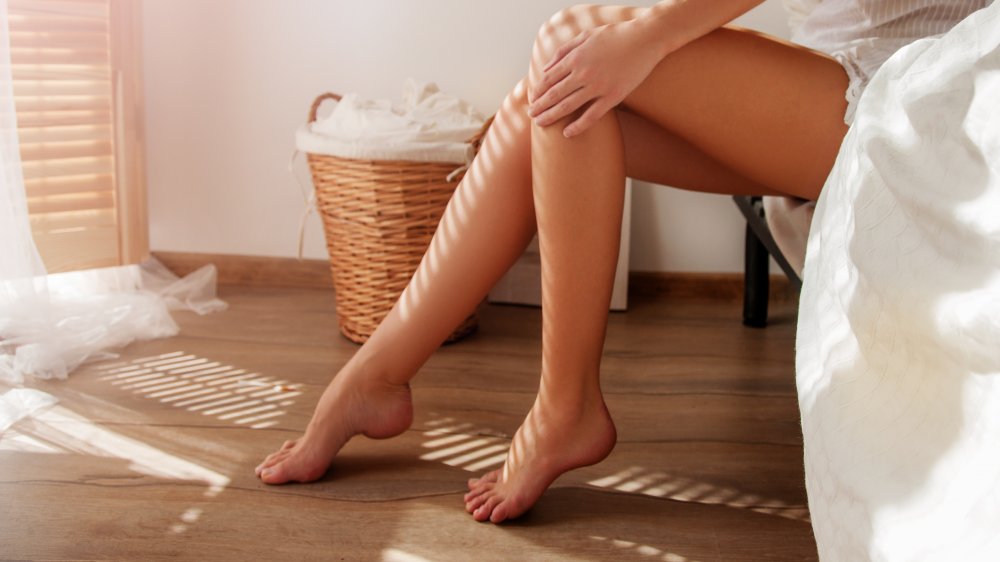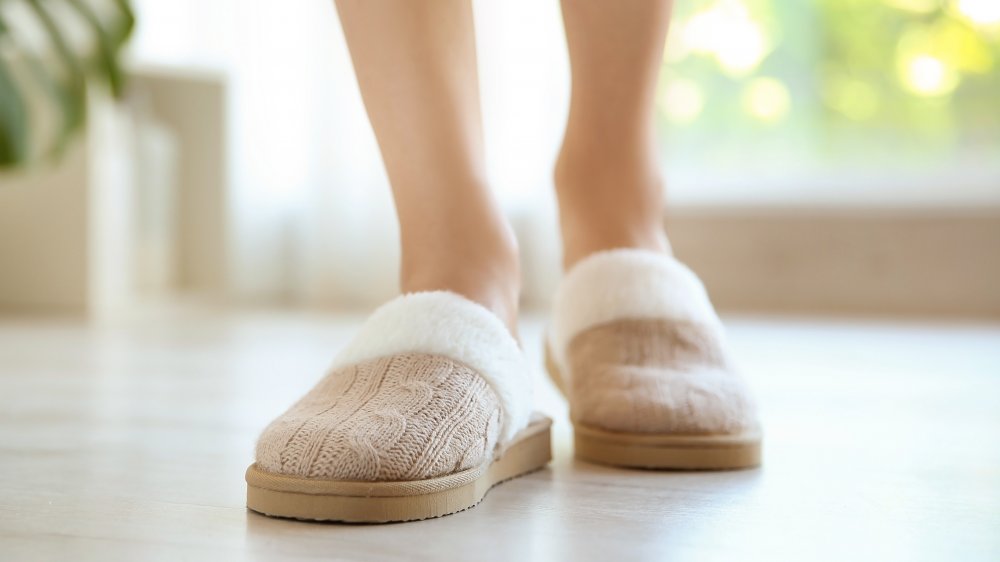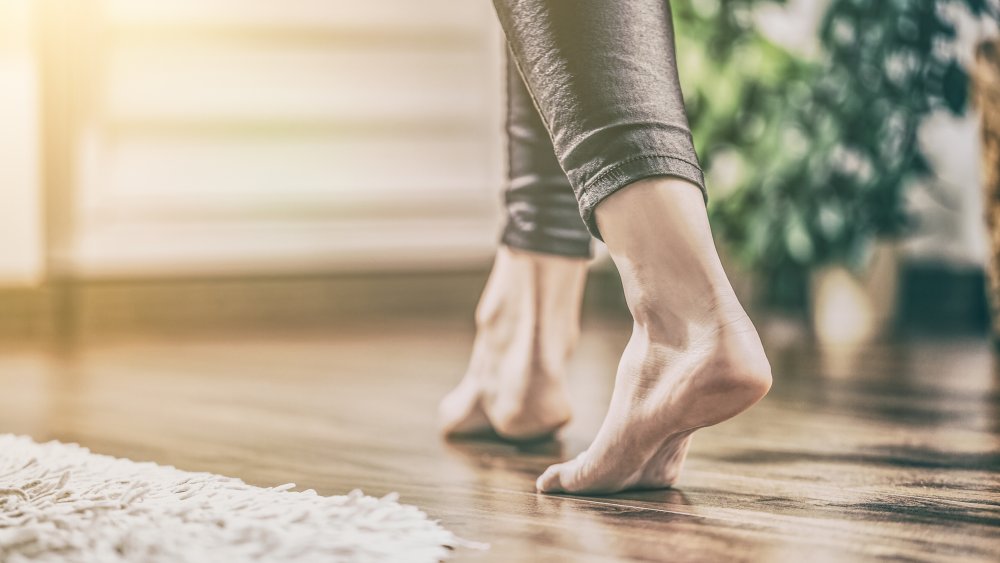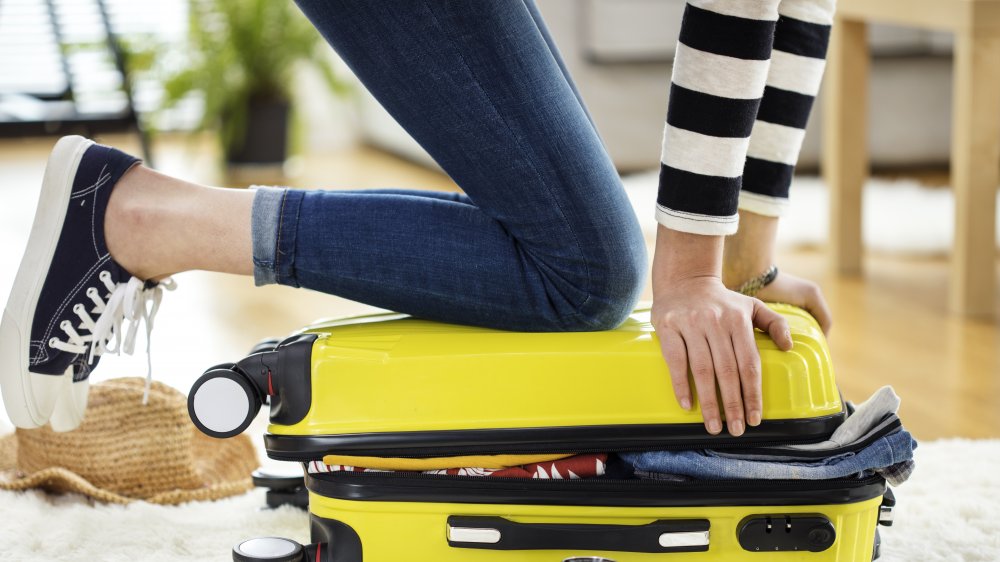Why You Shouldn't Walk Barefoot Around The House
Most parents and professional cleaners have a legitimate reason for wanting to keep outdoor shoes, well, outdoors, and that has to do with keeping the soles of our shoes from tracking dirt, grime, toxins like pesticides and industrial pollution, and traces of both human and animal waste into our homes. Outdoor shoes are even known to offer free passes to bacteria that can cause health issues, although that risk could be slightly exaggerated, according to The New York Times.
Many cultures practice shoe-free homes across Asia and the Middle East. But is the option of going barefoot — or perhaps just wearing soft fluffy slippers — at home a habit we should all be adopting? According to some podiatrists, the answer is a resounding, "no." And it's not because they aren't concerned about having us invite a few germs and some grime into the house. Rather, they worry that going barefoot around the house could open up our feet to developing different types of structural injuries.
Our feet don't deal with hard surfaces very well
Podiatrist Phil Vasyli says our feet were actually designed for walking on softer, natural surfaces (think sand and soil), not polished hard ones, so we may be damaging our feet by traipsing around our houses without any shoes on (via The Healthy). "Our footprint allows the natural ground to accommodate the contours of our feet," he explained, adding, "The softer ground gives way to our heel at foot strike, allowing the outside of the foot to sink into the surface, which correspondingly supports the inside of our foot and the collapse of our arch."
Because many household surfaces are hard, New York podiatrist Miguel Cunha says walking around indoors shoes-free puts pressure on our feet, causing the foot's arches to collapse — and that in turn puts pressure on different parts of our body (via Metro). Cunha is especially concerned about pronation, the rolling of the foot inward, which allows feet to support our body weight.
"When we walk barefoot, we pronate for a longer period of time, which then alters the biomechanics and distribution of pressure and weight across the foot. This imbalance may increase the progression of underlying foot deformities such as bunions and hammertoes and lead to painful conditions associated with excessive pronation such as arch and heel pain, shin splints, posterior tibial tendonitis and Achilles tendonitis," Cunha said.
And if you think throwing on a pair of squishy flip flips is the way to go, think again. The same worry applies here, too. "Contrary to common belief, shock absorption is not the answer to conditions associated with misalignment of the feet and lower limbs," explains Vasyli. "Sure, they feel comfortable but soft, flat foot beds allow the feet to over-pronate..."
Walking barefoot at home is not advised if you are older
Walking barefoot at home is especially not ideal if you are older. Podiatrist Nelya Lobkva tells Yahoo Lifestyle that after women hit the age of 50, "they lose the fat pad in the ball of the foot, diminishing the cushioning." That change hurts one's ability to protect the knees, hips, and lower back.
Meanwhile, a study by the Institute for Aging Research of Hebrew SeniorLife also shows that walking around the house without shoes has contributed to falls among the elderly in general (via Science Direct). Many falls resulted in serious injuries, including fractures, sprains, dislocations, and either pulled or torn muscles, ligaments, or tendons. "Our findings show that older people going barefoot, wearing only socks, or wearing slippers may be at considerably increased risk of falls in their homes. Therefore, older people should wear shoes at home whenever possible to minimize their risk of falling," research author Marian T. Hannan explained.
Wearing shoes will protect your feet against bacteria and fungi
If you're a germaphobe, this may put you off going around your house in bare feet for life: Your floors may be clean, but they can't really ever be completely germ free, and Cunha says walking barefoot indoors exposes your feet to potential infections caused by bacteria and fungi. "These organisms first infect the skin, and then they may infect the nails, leading to thickening, discoloration and brittleness of the nails. Both conditions become not only unsightly but also contribute to an unpleasant odor," Cunha tells Metro.
The best way to protect your feet is to pick up a good pair of indoor shoes, which you can change into when you get home. Doctors recommend looking for a pair that provides good arch support, particularly if you already suffer from a foot condition, such as weak arches or bunions.



